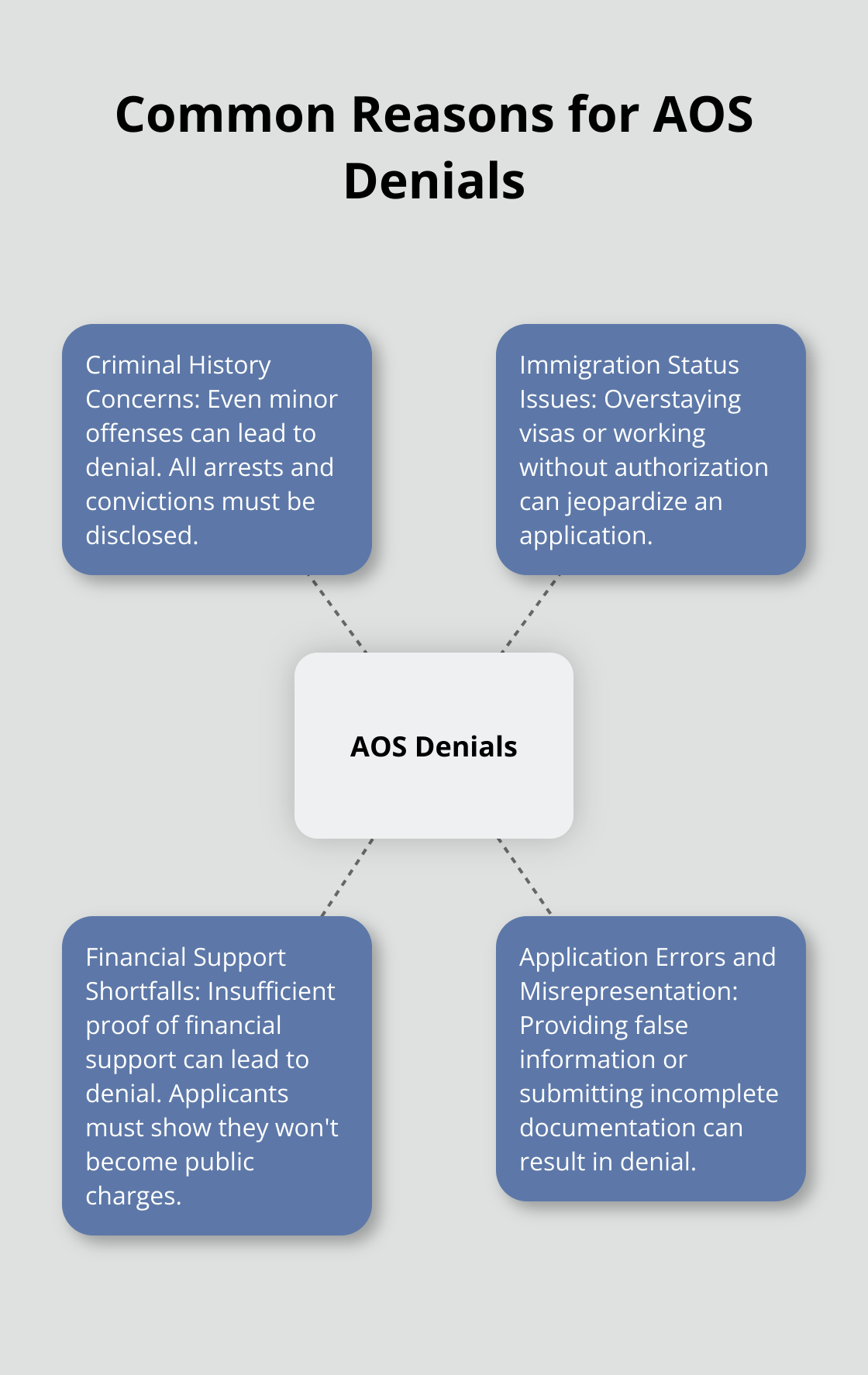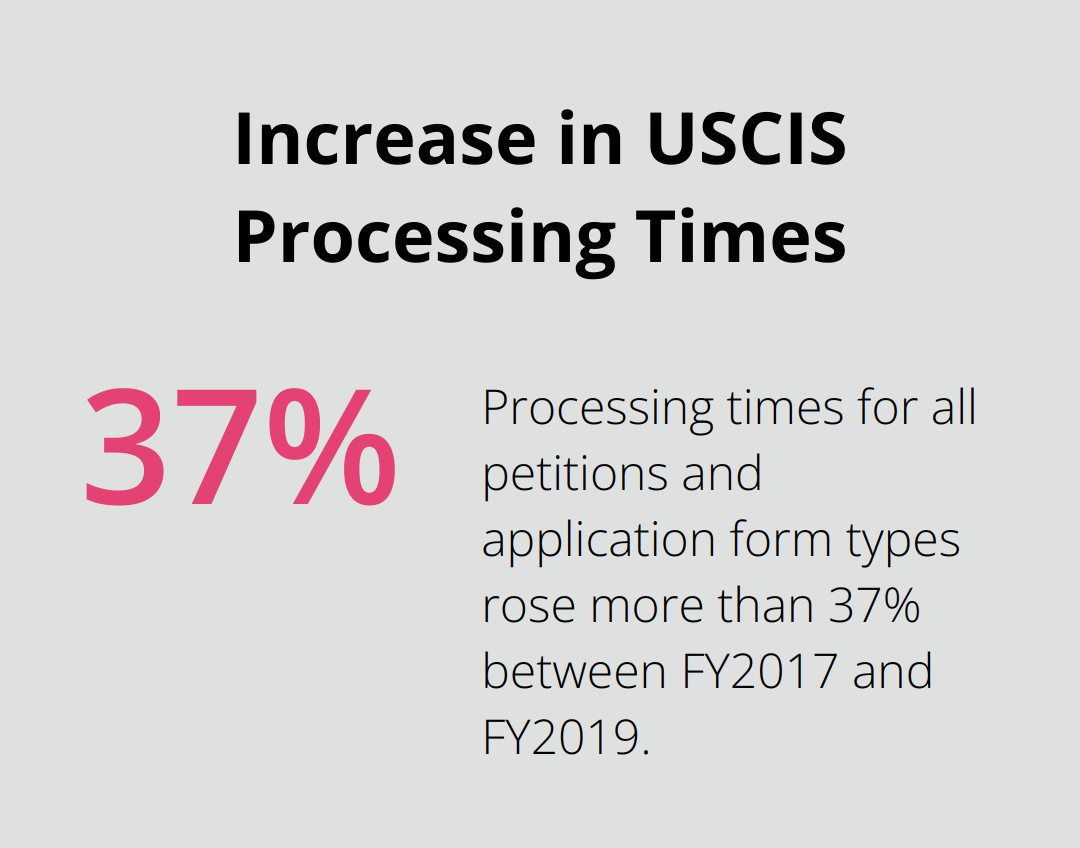
What Happens If Your Adjustment of Status Is Denied?
Applying for adjustment of status can be a complex and nerve-wracking process. At Law Offices of Jeffrey A. Thompson, we often encounter clients worried about what happens if their adjustment of status is denied.
Understanding the potential reasons for denial, available options, and consequences is vital for anyone navigating this challenging journey. This guide will provide you with essential information to help you prepare for various outcomes and make informed decisions about your immigration future.
Why Do Adjustment of Status Applications Get Denied?
Adjustment of Status (AOS) applications face denials for various reasons. Understanding these common pitfalls can help applicants navigate the process more effectively. Let’s explore the primary factors that lead to AOS denials:

Criminal History Concerns
A criminal record can significantly impact an AOS application. Even minor offenses may result in denial. Applicants must disclose all arrests and convictions (no matter how minor they seem). Failure to do so can be interpreted as misrepresentation, which is another ground for denial.
Immigration Status Issues
Maintaining lawful status is critical for AOS approval. These violations include overstaying visas or working without authorization. Even a single day of unlawful presence can jeopardize an application. Applicants should track their visa expiration dates meticulously and file for extensions well in advance.
Financial Support Shortfalls
Insufficient financial support often leads to AOS denials. The U.S. government requires proof that applicants won’t become public charges. Applicants struggling to meet this requirement might consider using a joint sponsor or providing additional evidence of assets.
Application Errors and Misrepresentation
Accuracy in AOS applications is paramount. This category includes providing false information, omitting crucial details, or submitting incomplete documentation. Applicants should double-check their applications and consider professional legal review to avoid these pitfalls.
Understanding these common reasons for denial can help applicants prepare more thoroughly for the AOS process. However, each case is unique, and navigating the complexities of immigration law often requires expert guidance. The next section will explore the options available to applicants who face an AOS denial.
What Are Your Options After AOS Denial?
An Adjustment of Status (AOS) denial can be a setback, but it doesn’t mark the end of your immigration journey. Several options exist for those facing this challenge. Let’s explore the paths available after an AOS denial.

Filing a Motion to Reopen or Reconsider
If you believe USCIS erred in denying your application, you can file a motion to reopen or reconsider. This action must occur within 30 days of the denial decision. A motion to reopen requires new facts or evidence unavailable during the initial application. A motion to reconsider argues that the denial stemmed from an incorrect application of law or policy.
Appealing to the Board of Immigration Appeals
In some instances, you may appeal to the Board of Immigration Appeals (BIA). This option typically applies if your denial included a Notice to Appear (NTA) in immigration court. You must file the appeal within 30 days of the immigration judge’s decision.
BIA appeals involve complex processes and lengthy timelines. The Administrative Appeals Office (AAO) strives to complete its appellate review within 180 days from the time it receives a complete case record, although some cases may take longer. This fact underscores the need for thorough preparation and patience.
Reapplying with New Evidence
Reapplying might prove your best option if your circumstances have changed or you’ve obtained new evidence supporting your eligibility. This approach works particularly well if the denial resulted from insufficient documentation or a temporary ineligibility that no longer applies.
When you reapply, address all issues mentioned in the denial letter.
Exploring Alternative Visa Options
An AOS denial might indicate ineligibility for permanent residency through your current path. In such cases, consider exploring alternative visa options. These could include employment-based visas, family-based petitions, or temporary non-immigrant visas that could lead to AOS eligibility in the future.
For example, if your employment-based AOS faced denial, you might apply for an H-1B visa or explore options for company transfer through an L-1 visa. Each path has unique requirements and processing times, necessitating careful consideration.
The aftermath of an AOS denial requires a strategic approach. While these options offer potential paths forward, each case presents unique challenges. Consulting with an experienced immigration attorney (such as those at Law Offices of Jeffrey A. Thompson) can help you understand the best course of action for your specific situation and increase your chances of a successful outcome. As we move forward, let’s examine the potential consequences of an AOS denial and how they might impact your immigration journey.
What Are the Consequences of AOS Denial?
An Adjustment of Status (AOS) denial can significantly impact an individual’s immigration journey. This section outlines the major consequences applicants may face if their AOS application is denied.
Potential Removal Proceedings
The most serious outcome of an AOS denial is the possibility of removal proceedings. If an applicant’s current visa has expired or they have violated the terms of their stay, USCIS may issue a Notice to Appear (NTA) in immigration court.
Loss of Current Immigration Status
AOS denial often results in the immediate loss of lawful status in the U.S. This situation presents particular problems for individuals who have maintained continuous lawful presence. For example, F-1 students who applied for AOS based on marriage to a U.S. citizen may find themselves out of status if their application is denied and their student visa has expired.
Impact on Future Immigration Applications
A denied AOS application can negatively affect future immigration endeavors. USCIS officers who review subsequent applications will have access to the denied application’s details. This increased scrutiny may lead to more skepticism and requests for additional evidence in future filings. Processing times for all petitions and application form types rose more than 37% between FY2017 and FY2019.

Restrictions on Travel and Employment
AOS denial typically invalidates any associated work permits (EADs) and travel documents (advance parole). This invalidation can severely limit an individual’s ability to work legally in the U.S. or travel internationally. H-1B visa holders who applied for AOS might find themselves unable to continue working if their H-1B status has expired and their AOS-based EAD is no longer valid.
Financial Implications
The financial consequences of an AOS denial can be substantial. Applicants may lose their job due to the invalidation of their work permit. They might also face additional legal fees if they choose to appeal the decision or explore alternative immigration options. Moreover, the fees paid for the initial AOS application (which can amount to several thousand dollars) are typically non-refundable.
Inadmissibility Concerns
In some cases, the reasons for AOS denial might relate to inadmissibility issues, such as criminal history. Even a single crime involving moral turpitude (CIMT) could potentially derail an individual’s path to lawful permanent residency, making it crucial to address such matters promptly and effectively.
Final Thoughts
Adjustment of status denials can significantly impact your ability to work, travel, and remain in the United States legally. However, a denial doesn’t mark the end of your immigration journey. You have several options, including filing motions to reopen or reconsider, appealing the decision, or exploring alternative visa pathways.
The intricate nature of immigration law makes professional legal guidance essential when facing what happens if your adjustment of status is denied. At Law Offices of Jeffrey A. Thompson, we specialize in guiding clients through complex immigration processes, including adjustment of status applications and appeals. Our experienced team can help you understand denial reasons, evaluate options, and develop a tailored strategy.
Proper preparation and attention to detail can increase your chances of a successful outcome. Whether you file an initial application or respond to a denial, knowledgeable legal support can make a difference. Don’t let an adjustment of status denial derail your dreams of living and working in the United States.


